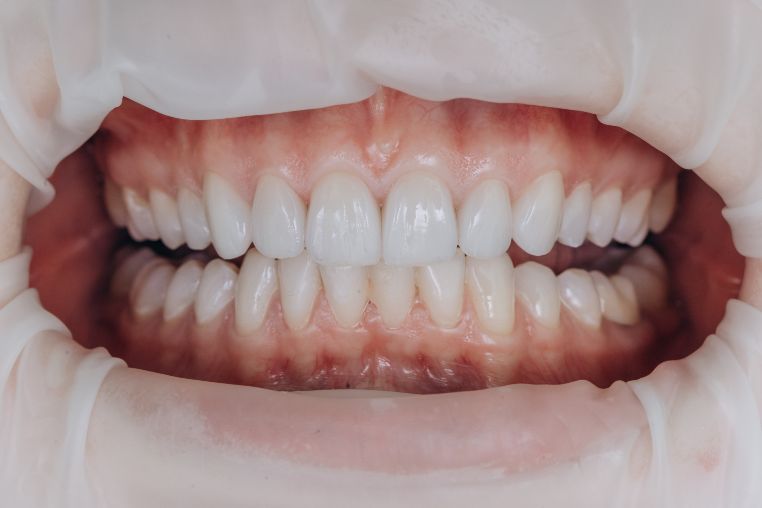A beautiful smile is something almost every person wants to have. No matter how hard you try to keep your teeth clean, healthy, and looking good, a dental issue that will affect the look of your teeth is bound to happen at some point in time. Luckily, cosmetic dentistry has come a long way, and having a cracked or discolored tooth can be fixed in no time with veneers. They are a long-lasting solution, however, nothing lasts forever, and the same applies to veneers. In this blog, we will explore the factors that determine how long veneers last, what affects their lifespan, and what you can do to ensure their longevity.
A veneer is a thin coating made out of porcelain or composite resin that is custom designed to cover the front of the tooth. Veneers are mostly purely cosmetical and their purpose is to hide imperfections such as chips, cracks, stains, and gaps in your teeth. Another use for a veneer is to correct minor misalignments and the shape or size of a tooth. They are custom-made to match the size, color, and shape of the surrounding teeth, resulting in a completely natural look that is almost impossible to notice.
The longevity of veneers is dictated by a few factors such as the material they are made from, the quality of the placement, and how well you care for them.
These types of veneers are made out of dental porcelain which bears a great resemblance to tooth enamel in terms of looks and structure.
The process of making porcelain veneers will require several appointments with your dentist. During the first appointment, a small amount of enamel is removed from the tooth's surface. The dentist will administer a small dose of local anesthesia before removing the enamel, so you won't feel any discomfort. This will ensure that the veneer fits perfectly into your mouth and aligns with other teeth.
After that, an impression is taken of your teeth and sent to a laboratory. It usually takes 2-4 weeks for the lab to craft the veneers, and when they are done you will need to make another appointment for them to be fitted and placed by a dentist.
Porcelain veneers are strong and durable, and usually last longer than their resin counterparts. With regular checkups and proper care, the average lifespan of a porcelain veneer is between 10 and 15 years, while in some cases they have been known to last for up to 25 years. A small downside is that the porcelain isn’t easy to repair, so if they are damaged, the veneers will most likely need to be completely replaced.
A great thing about composite veneers is that you can have them done with just one appointment with the dentist. They aren't made outside the mouth like the porcelain ones, because the composite resin is applied directly onto the tooth after it has been treated with an acidic gel that roughens up the enamel so the veneer will adhere to the tooth more firmly. The dentist will then use a special curing light that will harden the resin and get it ready for fine shaping. After it has hardened it is then polished and shaped to match the contours of the surrounding teeth.
Composite veneers usually last for 4-8 years, depending on how well they are cared for. Composite resin is not as strong as porcelain and is more prone to chip and crack, however, it is easily repaired so if that happens, you won't need a complete replacement.
So the pros of composite vs porcelain veneers are that the composites are cheaper, require only one appointment to get them done, and are repaired easily. The cons are that they don't last as long, are more prone to staining and discoloration, and are not as durable.

Your oral hygiene will greatly affect how long your veneers will last. Here are a few tips on how to increase their lifespan:
Following these simple rules can make your veneers last longer than their average lifespan, and look great for years to come.
Several factors determine if your veneers need to be replaced. When cared for and maintained properly they usually last 10-15 years. Their lifespan is greatly dictated by oral hygiene, lifestyle, diet, habits, and natural wear and tear of the material used in making them.
It is almost certain that you will need to replace your veneers at some stage of your life. As you age your gums might start receding, exposing the edges of your veneers. This will require changing or adjusting them, to maintain the appearance of your teeth.
If your veneer chips, cracks, or changes color make sure to visit your dentist so they can access the issue and determine if the damage is repairable, or if the veneer needs to be changed completely.
When it's time for you to get veneers done, it is very important who you choose to carry out the task. The design of your veneers plays a crucial role in how much they will last, so choosing a trusted and skilled dentist is very important. If you still don’t have a dentist that you visit regularly, and can’t decide on how to choose one, ask the ones that you are considering to show you how some examples of their previous work. If they are truly masters of their craft, they will be happy and proud to show them to you!

